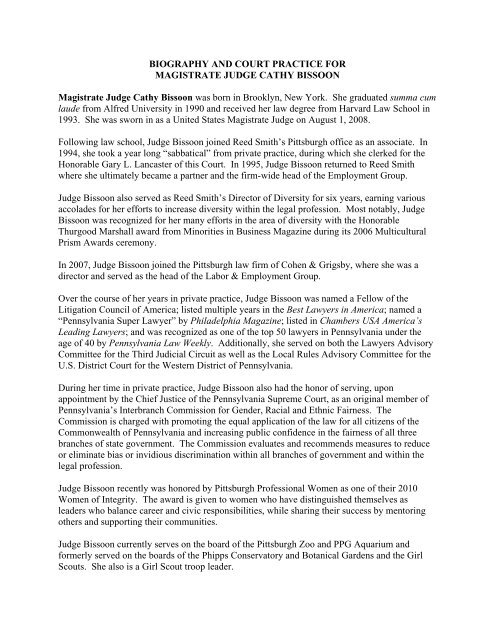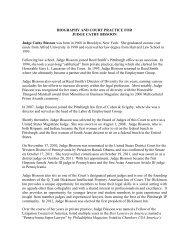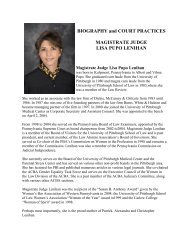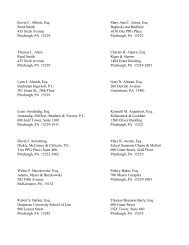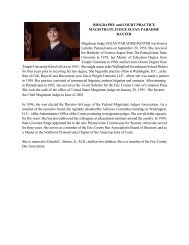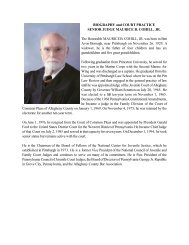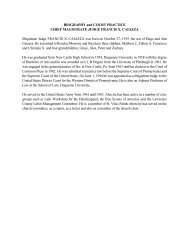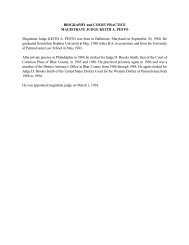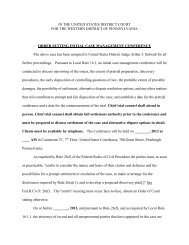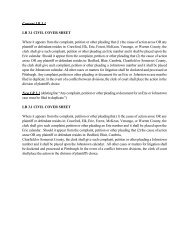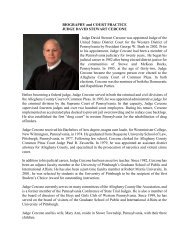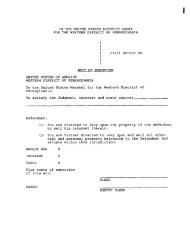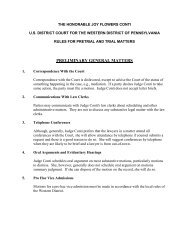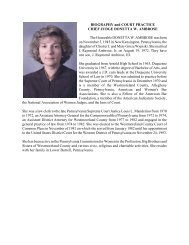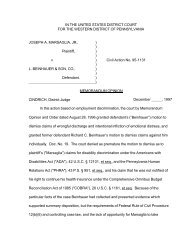BIOGRAPHY AND COURT PRACTICE FOR MAGISTRATE JUDGE ...
BIOGRAPHY AND COURT PRACTICE FOR MAGISTRATE JUDGE ...
BIOGRAPHY AND COURT PRACTICE FOR MAGISTRATE JUDGE ...
Create successful ePaper yourself
Turn your PDF publications into a flip-book with our unique Google optimized e-Paper software.
<strong>BIOGRAPHY</strong> <strong>AND</strong> <strong>COURT</strong> <strong>PRACTICE</strong> <strong>FOR</strong><strong>MAGISTRATE</strong> <strong>JUDGE</strong> CATHY BISSOONMagistrate Judge Cathy Bissoon was born in Brooklyn, New York. She graduated summa cumlaude from Alfred University in 1990 and received her law degree from Harvard Law School in1993. She was sworn in as a United States Magistrate Judge on August 1, 2008.Following law school, Judge Bissoon joined Reed Smith’s Pittsburgh office as an associate. In1994, she took a year long “sabbatical” from private practice, during which she clerked for theHonorable Gary L. Lancaster of this Court. In 1995, Judge Bissoon returned to Reed Smithwhere she ultimately became a partner and the firm-wide head of the Employment Group.Judge Bissoon also served as Reed Smith’s Director of Diversity for six years, earning variousaccolades for her efforts to increase diversity within the legal profession. Most notably, JudgeBissoon was recognized for her many efforts in the area of diversity with the HonorableThurgood Marshall award from Minorities in Business Magazine during its 2006 MulticulturalPrism Awards ceremony.In 2007, Judge Bissoon joined the Pittsburgh law firm of Cohen & Grigsby, where she was adirector and served as the head of the Labor & Employment Group.Over the course of her years in private practice, Judge Bissoon was named a Fellow of theLitigation Council of America; listed multiple years in the Best Lawyers in America; named a“Pennsylvania Super Lawyer” by Philadelphia Magazine; listed in Chambers USA America’sLeading Lawyers; and was recognized as one of the top 50 lawyers in Pennsylvania under theage of 40 by Pennsylvania Law Weekly. Additionally, she served on both the Lawyers AdvisoryCommittee for the Third Judicial Circuit as well as the Local Rules Advisory Committee for theU.S. District Court for the Western District of Pennsylvania.During her time in private practice, Judge Bissoon also had the honor of serving, uponappointment by the Chief Justice of the Pennsylvania Supreme Court, as an original member ofPennsylvania’s Interbranch Commission for Gender, Racial and Ethnic Fairness. TheCommission is charged with promoting the equal application of the law for all citizens of theCommonwealth of Pennsylvania and increasing public confidence in the fairness of all threebranches of state government. The Commission evaluates and recommends measures to reduceor eliminate bias or invidious discrimination within all branches of government and within thelegal profession.Judge Bissoon recently was honored by Pittsburgh Professional Women as one of their 2010Women of Integrity. The award is given to women who have distinguished themselves asleaders who balance career and civic responsibilities, while sharing their success by mentoringothers and supporting their communities.Judge Bissoon currently serves on the board of the Pittsburgh Zoo and PPG Aquarium andformerly served on the boards of the Phipps Conservatory and Botanical Gardens and the GirlScouts. She also is a Girl Scout troop leader.
I. GENERAL MATTERS<strong>PRACTICE</strong>S <strong>AND</strong> PROCEDURES OF<strong>MAGISTRATE</strong> <strong>JUDGE</strong> CATHY BISSOONA. Communications with the Court:Counsel are not to send correspondence to Judge Bissoon, unless she specificallyrequests or approves the same. Requests for the rescheduling of conferences maybe made by telephone to the Court’s Deputy Clerk but only if counsel for allparties are on the line. Otherwise, such requests are to be made by motion.B. Communications with Law Clerks:Counsel are not to contact Judge Bissoon’s law clerks. If they wish to consult onthe status of a matter or an appropriate procedure, counsel are to call her DeputyClerk.C. Telephone Conferences:Requests for counsel or parties to participate by phone will be considered on acase by case basis. When a telephone conference by counsel is permitted by theCourt, counsel must initiate the call and contact the Court once all parties are online.DPro Hac Vice Admissions:Judge Bissoon will rule upon pro hac vice motions in cases assigned to her.Lawyers not admitted in this District may not move for pro hac viceadmission on their own behalf.E. Comments to the Media:Attorneys are expected to adhere to the Rules of Professional Conduct in alldealings, including those with the media.
D. Scheduling:Unless otherwise ordered, responses to all non-dispositive motions shall be filedwithin eleven (11) days of service. Responses to motions to dismiss shall be filedwithin twenty (20) days of service, and responses to motions for summaryjudgment shall be filed within thirty (30) days of service. Generally, a separatebriefing order will not be issued. Where a brief is required, it must be filedsimultaneously with the motion.Following a Post-Discovery Status Conference, the Court will issue an ordersetting forth, inter alia, the deadline for filing summary judgment motions.E. Evidentiary Hearings:Evidentiary hearings on pretrial matters generally are scheduled in advance oftrial. When counsel concludes that an evidentiary hearing is appropriate, theyshould confer with opposing counsel and request a hearing by motion.F. Motions In Limine:Counsel shall comply in all respects with Local Rule 16.1.C.4 with regard tomotions in limine. To the extent counsel deems it necessary to file such motions,the date for filing the motion and supporting brief will be set forth in the FinalPretrial Order. Generally, the Court will rule on these motions prior to trial.G. Proposed Orders:In accordance with local rules, each and every motion shall be accompanied by aproposed Order of Court. The Order of Court shall include language detailing thespecific relief sought, and not simply that the motion “is granted.”
III.CIVIL CASESA. Pretrial Procedures:1. Initial Scheduling Order:The Court uses an Initial Scheduling Order based on Local Rule 16.1.B.2. Initial Scheduling Conference:Pursuant to Local Rule 16.1, after the filing of an Answer by the defendant, JudgeBissoon will issue an order setting the date of the initial scheduling conference.Prior to the conference, the parties shall meet and confer and file a report pursuantto Fed. R. Civ. P. 26(f), the form of which is set forth in “Appendix LCvR 16.1A”to the Local Rules. Additionally, at least three (3) business days prior to theInitial Rule 16 Scheduling Conference, counsel for every party shall submit aposition letter to this Court. 1The position letter shall set forth the following:(a) A brief recitation of the facts; (b) A discussion of your party’s strengths andweaknesses; and (c) Your party’s settlement posture. To ensure candor, theposition letters are not to be filed nor shared with opposing counsel, but rather,faxed directly to Judge Bissoon’s Chambers at (412) 208-7467. All positionletters will be kept confidential.3. Post-Discovery Status Conference:A Post-Discovery Status Conference will be held no more than 30 days after theclose of discovery in each case. Prior to that conference, the parties shall meetand confer regarding settlement of the case and, at least three (3) business daysprior to the Post-Discovery Status Conference, counsel for every party shall1Position papers are not required in cases in which the parties have consented to a bench trial before JudgeBissoon.
submit a position letter to this Court. 2The position letter shall set forth thefollowing: (a) A brief recitation of the facts; (b) A discussion of your party’sstrengths and weaknesses; and (c) Your party’s settlement posture. To ensurecandor, the position letters are not to be filed nor shared with opposing counsel,but rather, faxed directly to Judge Bissoon’s Chambers at (412) 208-7467.All position letters will be kept confidential.4. Final Pretrial/Settlement Conference:After the court has ruled on all dispositive motions, a final conference will be heldto discuss settlement and any pretrial matters that do not require the decision ofthe district court judge who will be trying the case (if the case is referred to JudgeBissoon). On consent cases, the final pretrial conference shall be conducted inaccordance with Local Rule 16.1.C. Prior to that conference, the parties shallmeet and confer regarding settlement of the case and, at least three (3) businessdays prior to the Final Pretrial Conference, counsel for every party shall submit aposition letter to this Court. 3The position letter shall set forth the following:(a) A brief recitation of the facts; (b) A discussion of your party’s strengths andweaknesses; and (c) Your party’s settlement posture. To ensure candor, theposition letters are not to be filed nor shared with opposing counsel, but rather,faxed directly to Judge Bissoon’s Chambers at (412) 208-7467. All positionletters will be kept confidential.23Position papers are not required in cases in which the parties have consented to a bench trial before JudgeBissoon.Position papers are not required in cases in which the parties have consented to a bench trial before JudgeBissoon.
5. Settlement Authority and ADR:Judge Bissoon requires counsel and their clients, or persons with authority(including insurance companies), to be present at settlement conferences. Forgood cause shown or at the Court’s direction, the client or person with settlementauthority may be permitted to participate by telephone.Cases filed after January 1, 2008, are required to participate in the Court’s ADRprogram pursuant to Local Rule 16.2. Prior to the Initial Case ManagementConference, counsel must submit a Stipulation to an ADR process consistent withLocal Rule 16.2.D. Stipulation forms are available on the Court’s website andmust specify a proposed neutral. If the parties cannot agree on a proposedneutral, one will be selected by the Court.6. Extensions and Continuances:Requests for extensions of time and continuances shall be presented by writtenmotion, contain supporting facts and indicating the position of opposing counsel.Reasonable extensions will generally be granted for good cause shown.B. Discovery Matters:1. Length of Discovery Period:Counsel must comply with the provisions of Fed.R.Civ.P. 26 and must file thewritten report required by Rule 26(f) prior to the initial scheduling conference.Generally, for cases filed after January 1, 2008 that are subject to the Court’sADR program, the length of discovery shall be 150 days if the parties choosemediation or early neutral evaluation as their ADR process. If the parties choosearbitration, the length of discovery shall be 120 days.
2. Expert Witnesses:Expert depositions may be deferred until after dispositive motions uponagreement of the parties and the Court.3. Discovery/Deposition Disputes:Counsel for the parties must confer on discovery disputes, prior to seeking theCourt’s intervention. If counsel for the parties cannot resolve the dispute,Judge Bissoon requires that the parties contact the Court to set up a conference inan effort to resolve the matter, rather than file a formal discovery motion. Absentgood cause shown, a failure to follow the above procedures shall result in a denialof any discovery motion, without prejudice.For discovery disputes that arise during a deposition, the attorneys together maycontact the Court to resolve the matter.4. Stay of Discovery:The filing of a motion to dismiss or other dispositive motion generally will notstay discovery. A stay may be sought by motion but will be granted only if theright to relief is clear or some other compelling reason exists. Participation in anADR process will not stay discovery.5. Limitations or Expansions on Discovery:The Court follows the Federal Rules of Civil Procedure on this matter and doesnot impose additional restrictions or limitations. To the extent that the partiesseek to expand the limits set forth in the Federal Rules of Civil Procedure, thisshould be addressed in the parties’ Rule 26(f) report. See “Appendix LCvR16.1A” to the Local Rules.
6. Rule 11 Motions - Rule 37 Sanctions:Counsel are expected to comply with the Federal and Local rules. The Court hasno additional requirements and will rule promptly.C. Injunctions and TROs:When these matters are referred by a District Court Judge for Report andRecommendation or in consent cases, a briefing schedule will be issued and ahearing date will be scheduled, if necessary.D. Trial Procedures:1. Scheduling of Cases:For cases in which the parties have consented to jurisdiction before JudgeBissoon, a date certain will be given for trial following the resolution of Rule 56motions or, if none are filed, at the Post-Discovery Status Conference. Vacationschedules and personal/professional obligations that conflict with the trial datewill be accommodated where possible. The Court must be notified of any conflictas soon as possible.2. Trial Hours/Days:Generally, cases will be tried Monday through Thursday from 9:30 a.m. to4:30 p.m., with breaks as appropriate. Absent extraordinary circumstances,testimony will not be heard on Fridays, although closings, jury charges and jurydeliberations may take place on Fridays. Judge Bissoon will meet with counselbefore and after these appointed times to discuss trial/evidentiary issues.
3. Trial Briefs:Trial briefs are not required, but are encouraged when counsel believe that suchbriefs would assist the Court. Such briefs should not exceed fifteen (15) pagesand should be filed at least one (1) week prior to trial.4. Voir Dire:Judge Bissoon’s Deputy Clerk or Law Clerk will conduct the preliminary voirdire of potential jurors consistent with the Local Rules. Counsel may submitproposed voir dire for the Court's consideration at the time established in the FinalPretrial Order.5. Note-taking by Jurors:Judge Bissoon allows jurors to take notes, unless a valid objection is voiced.6. Side Bars:Reasonable side bars will be permitted when necessary.7. Examination of Witnesses Out of Sequence:Judge Bissoon will permit the examination of a witness out of sequence, eitherwithin the party's own case or within an opposing party's case, on a showing ofgood cause or by consent of all parties. In the event that a witness will beunavailable for trial, the witness's testimony may be presented by videodeposition or deposition testimony may be read into the record.8. Opening and Closing Statements:There are no Court-imposed time limits on opening or closing statements,although the length of such statements should be reasonable. Defense counselmay defer opening statements.
9. Examination of Witnesses or Argument by More than One Attorney:Only one attorney for each party may conduct an examination of any witness,argue any motion or point, or give the opening or closing statements.10. Examination of Witnesses Beyond Direct and Cross:Judge Bissoon will permit redirect and recross of a witness as necessary, but doesnot typically permit any further examination.11. Videotaped Testimony:Judge Bissoon does not have any special procedures or requirements with respectto the use or admission of videotaped testimony, but requires the parties tocomply with the Local Rules governing video depositions, except that therecording is not to be filed with the Clerk. Counsel should inform the Court inadvance of trial of the intention to use video testimony, so that the Judge andparties may discuss the procedures to be utilized.12. Reading of Material into the Record:Judge Bissoon has no policy or rules on this point and it will be considered on acase by case basis.13. Exhibits:All exhibits must be listed in the Pretrial Narrative Statements. Generally,Plaintiff(s) shall use numbers and defendant(s) shall use letters. The parties areexpected to comply with Local Rule 16.1.C.5.a by exchanging exhibits prior tothe final pretrial conference and should be prepared to indicate a position at thefinal pretrial conference with regard to the authenticity and admissibility of theopponent's exhibits. All exhibits shall be marked before trial. Exhibits may beintroduced out of sequence.
Counsel shall obtain the Court's approval in advance for use of any demonstrativeaid(s) during opening statements. Demonstrative aids are permitted during trialabsent a sustained objection.14. Jury Instructions and Verdict Forms:The Court requires counsel to confer and submit a single set of agreed upon juryinstructions and a proposed verdict form. To the extent that the parties cannotagree on a particular instruction or form, counsel for each party shall submithis/her version of the particular instruction and/or form, along with supportingauthority for that instruction or form. If the party believes that a particularinstruction should not be included at all, that party shall submit supportingauthority for that position. The date for filing same will be set in the Final PretrialOrder. The Court will hold a charging conference at which time counsel willreceive the final charge and verdict form to be given to the jury.15. Proposed Findings of Fact and Conclusions of Law:In non-jury trials, Judge Bissoon requires the submission of proposed findings offact and conclusions of law. The parties shall file consecutively numberedproposed findings of fact and conclusions of law. The proposed findings of factshall address each contested issue of fact and cite support by clear and explicitreference to the record evidence relied upon. Each proposed conclusion of lawshall be supported by citation to the appropriate authority. With the proposedfindings of fact and conclusion of law, the parties also shall file and serve a briefin support of judgment that integrates the proposed findings of fact with theproposed conclusions of law to demonstrate why the relief requested should begranted. The supporting brief shall not exceed twenty (20) pages. The proposedfindings of fact and conclusions of law, along with the supporting brief, shall be
filed within twenty (20) days of the final day of trial. The Court also requires thatthe parties separately submit to the Court their respective proposed findings andconclusions in an editable word processing format.16. Offers of Proof:Offers of proof should not be required since the Court sets aside time before andafter a trial day to discuss trial/evidentiary matters with counsel. Should the needarise during trial, however, the Court does not impose any restrictions.17. General Courtroom Decorum:Counsel shall conduct themselves with respect, courtesy and civility at all times.The Court will not tolerate demonstrations of hostility or of discrimination or biasof any kind.E. Jury Deliberations:1. Written Jury Instructions:Judge Bissoon gives the jury a written copy of her jury instructions.2. Exhibits in the Jury Room:Judge Bissoon permits exhibits to be provided to the jury for their deliberations,so long as counsel agree upon the exhibits that are to be provided.3. Jury Requests to Read Back Testimony or Replay Tapes DuringDeliberations:Where appropriate, Judge Bissoon will permit the reading back oftestimony to the jury.
4. Jury Questions:If a question is submitted to the Court, the Judge will discuss the question withcounsel prior to giving an answer to the jury.5. Availability of Counsel During Jury Deliberations:Counsel must be available in person or by telephone during jury deliberations.6. Interviewing the Jury:Judge Bissoon advises jurors that they do not have to respond to inquiries fromcounsel. She does instruct the jurors, however, that responses may be helpful tocounsel.IV.CRIMINAL CASESCriminal cases before Judge Bissoon are limited to petty offenses, misdemeanorcharges and preliminary criminal proceedings (e.g., initial appearance,arraignment, detention hearings, etc.). Counsel must be well prepared and haveconferred with their client prior to the scheduled criminal proceeding. Counselshall conduct themselves with courtesy and civility at all times and should bemindful of the Court’s time.In the context of out-of-district arrests, it is expectation of the Court that beforethe initial appearance in the matter, the appropriate Assistant U.S. Attorneypromptly inform him/herself of the context in which the case arises in our District.


